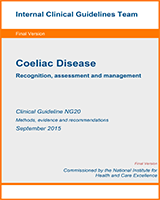Coeliac Disease
NICE Guideline, No. 20
Excerpt
Coeliac disease is an autoimmune condition associated with chronic inflammation of the small intestine, which can lead to malabsorption of nutrients. Dietary proteins, known as glutens, which are present in wheat, barley and rye activate an abnormal mucosal immune response. Clinical and histological improvements usually follow when gluten is excluded from the diet.
Coeliac disease can present with a wide range of clinical features, both gastrointestinal (such as indigestion, diarrhoea, abdominal pain, bloating, distension or constipation) and non-gastrointestinal (such as fatigue, dermatitis herpetiformis, anaemia, osteoporosis, reproductive problems, short stature, neuropathy, ataxia or delayed puberty). Although some people present with typical symptoms, others have few or no symptoms.
People with autoimmune conditions such as type 1 diabetes and autoimmune thyroid disease, or people with a first-degree family history of coeliac disease, have an increased likelihood of coeliac disease.
Disclaimer: Healthcare professionals are expected to take NICE clinical guidelines fully into account when exercising their clinical judgement. However, the guidance does not override the responsibility of healthcare professionals to make decisions appropriate to the circumstances of each patient, in consultation with the patient and/or their guardian or carer.
